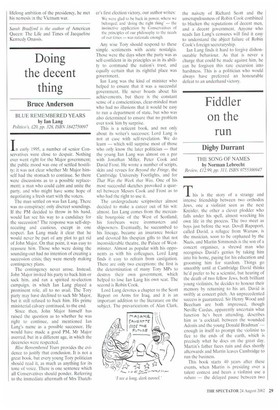Doing the decent thing
Bruce Anderson
BLUE REMEMBERED YEARS by Ian Lang
Politico's, £20, pp. 328, ISBN 1842750097
In early 1995, a number of senior Conservatives were close to despair. Nothing ever went right for the Major government; the public mood was one of settled hostility; it was not clear whether Mr Major himself had the stomach to continue, So there were discussions as to a possible replacement: a man who could calm and unite the party, and who might have some hope of negotiating a fresh start with the voters.
The man settled on was Ian Lang. There was no conspiracy; only discreet soundings. If the PM decided to throw in his hand, would Ian see his way to a candidacy for the succession? The response was self-deprecating and cautious, except in one respect. Ian Lang made it clear that he would never be part of any plot to get rid of John Major. On that point, it was easy to reassure him. Those who were doing the sounding-out had no intention of creating a succession crisis; they were merely making contingency plans.
The contingency never arose. Instead. John Major invited his party to back him or sack him, and ran a spirited re-election campaign, in which Ian Lang played a prominent role, all to no avail. The Tory party may have declined to sack Mr Major, but it still refused to back him. His prime ministerial calvary continued, to the end.
Since then, John Major himself has raised the question as to whether he was right to continue, and mentioned Ian Lang's name as a possible successor. He would have made a good PM, Mr Major averred, but in a different age, in which the decencies were respected.
Blue Remembered Years provides the evidence to justify that conclusion. It is not a great book. but every young Tory politician should read it, as much as anything for its tone of voice. There is one sentence which all Conservatives should ponder. Referring to the immediate aftermath of Mrs Thatch er's first election victory, our author writes: We were glad to be back in power, where we belonged; and 'doing the right thing — the instinctive application by Conservatives of the principles of our philosophy to the needs of our times — was rationale enough.
Any wise Tory should respond to these simple sentiments with acute nostalgia. Those were the days when the party was as self-confident in its principles as in its ability to command the nation's trust, and equally certain that its rightful place was government.
Ian Lang was the kind of minister who helped to ensure that it was a successful government. He never boasts about his achievements, but there is the constant sense of a conscientious, clear-minded man who had no illusions that it would be easy to run a department of state, but who was also determined to ensure that no problem ever took him by surprise.
This is a reticent book, and not only about its writer's successes; Lord Lang is not at ease with self-revelation. We do learn — which will surprise most of those who only know the later politician — that the young Ian Lang was almost on a par with Jonathan Miller, Peter Cook and David Frost. He wrote a number of scripts, skits and revues for Beyond the Fringe, the Cambridge University Footlights, and for That Was the Week that Was. One of his most successful sketches provoked a quarrel between Messrs Cook and Frost as to who had the right to use it.
The undergraduate scriptwriter almost decided to make a career out of his wit: almost. Ian Lang comes from the mercantile bourgoisie of the West of Scotland; his forebears were ironmasters and shipowners. Eventually, he succumbed to his lineage, became an insurance broker and devoted his thespian gifts to that not inconsiderable theatre, the Palace of Westminster. Almost as popular with his opponents as with his colleagues, Lord Lang finds it easy to refrain from castigation. There are only two exceptions: the first is the determination of many Tory MPs to destroy their own government, which helped to lose Ian Lang his own seat. The second is Robin Cook.
Lord Lang devotes a chapter to the Scott Report on Arms for Iraq, and it is an important addition to the literature on the subject. The prevarications of Alan Clark,
the naivety of Richard Scott and the unscrupulousness of Robin Cook combined to blacken the reputations of decent men, and a decent government. Anyone who reads Ian Lang's censures will find it easy to understand the abject failure of Robin Cook's foreign secretaryship.
Ian Lang finds it hard to forgive dishonourable behaviour. As that is never a charge that could be made against him, he can be forgiven this rare excursion into harshness. This is a politician who would always have preferred an honourable defeat to an underhand victory.






























































 Previous page
Previous page